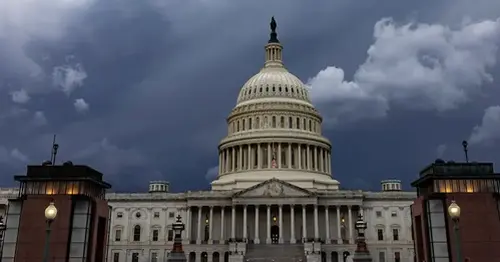
Three paths to raising debt limit — and why all of them are murky
WASHINGTON — The Republican-controlled House passed a debt limit increase last week tied to spending cuts and a rollback of President Joe Biden's agenda, sending it to the Democratic-led Senate before it left town for recess.
The bill is doomed in the Senate. And Biden has promised to veto it if it lands on his desk.
So, what next?
The path to averting default is murky. And the Treasury Department's deadline to act or risk an economic calamity is June 5, although the date is likely to be adjusted.
Here are three potential paths to Congress' raising the debt limit — and a look at why all of them are uncertain:
PATH #1: Biden and McCarthy negotiate
Biden has been adamant he won't grant policy concessions simply to pay the bills that Congress has already racked up — or pay a ransom in a hostage negotiation, as he sees it. But even if Biden backs down and agrees to open discussions to extinguish the threat of default, the endgame is far from apparent.
House Speaker Kevin McCarthy's bill passed by a razor-thin margin of 217-215 after he included provisions to repeal major parts of Biden's signature Inflation Reduction Act — including money for enhanced IRS enforcement and clean energy funding and tax credits. Any deal with Biden would require stripping out a repeal of his agenda. And cutting such a deal would risk backlash for McCarthy, R-Calif., from his own members — some House conservatives say the bill is a minimum.
Senate Minority Leader Mitch McConnell, R-Ky., warned that any debt limit bill that can pass the Senate is similarly doomed in the House and that therefore the only way to break the stalemate is for Biden and McCarthy to work it out. Democrats say no.
“What we’ve said very clearly is that we’re not going to negotiate over whether or not the United States pays its bills on time,” Sen. Chris Van Hollen, D-Md., said, adding that McCarthy's passing his bill “does nothing to change that position.”
PATH #2: Pass a clean debt ceiling increase
This has long been the demand from Biden, Senate Majority Leader Chuck Schumer, D-N.Y., and House Minority Leader Hakeem Jeffries, D-N.Y. — extend the debt limit without policy conditions.
Some Democratic leaders believed that McCarthy would fail to pass any bill and be forced to swallow a clean debt limit increase. But that became less likely after McCarthy wrote legislation and got the backing of his caucus — all but four Republicans — to pass it in the House.
For McCarthy to back down now would be a surprising about-face, one that could land him in hot water — again — with the 20 GOP lawmakers who initially tried to block him from becoming speaker. Under a new rule they secured, any House member can force a vote to overthrow the speaker.
There's no sign that McCarthy intends to back down, and he faces less pressure to do so after he defied skeptics and steered his Republican-only bill through the narrowly divided chamber.
"The only thing I would tell him was no clean debt ceiling is gonna pass the House," McCarthy said, referring to Biden.
Any debt ceiling bill backed by Democrats would need at least nine Republican votes to pass the Senate (perhaps 10, with Dianne Feinstein, D-Calif., out indefinitely because of illness). And after the House passed a conservative bill, GOP senators are doubling down on the push for Biden to negotiate with McCarthy rather than acceding to a clean debt ceiling bill.
PATH #3: Tie debt limit to government funding
Some congressional aides believe the way out is to attach a debt limit extension to a bipartisan government funding bill, which is due by Sept. 30 to prevent a shutdown.
That's how Congress tended to raise the debt ceiling with little fanfare in recent years during the Trump administration: Each side can come away with some victories and focus on them.
There are a few problems with that.
The first is the calendar. A hard deadline in the first half of June leaves little time for negotiating a funding bill, which is complicated and tends to stretch on for months. The Treasury Department is expected to update the "X date" for Congress to act on the debt limit, and if the bills can be paid until July or August, it buys time.
The second problem is that the last several bipartisan government funding deals — under Biden and Trump — increased federal spending: Republicans wanted higher military spending, and Democrats wanted higher domestic funding. To do that again would be a reversal for McCarthy, who has demanded spending cuts to extend the borrowing limit.
Source: https://www.nbcnews.com/politics/congress/three-paths-raising-debt-limit-are-murky-rcna81987






